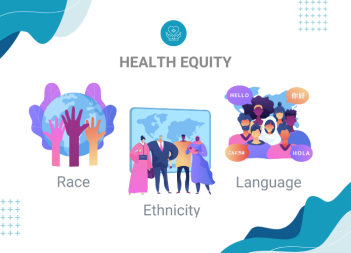Unlocking the Potential of Health Assessments to Advance Health Equity and Reduce Disparities in Healthcare

To further advance health equity and improve health outcomes for the more than 170 million individuals supported by the Center for Medicare and Medicaid Services (CMS) programs, CMS has published the CMS Framework for Health Equity 2022-2032. The framework sets priorities to identify and eliminate barriers to benefits and services based on race/ethnicity, language, gender identity, sexual orientation, and social factors such as housing, transportation, and food insecurity.
CMS is also proposing to establish a health equity index (HEI) in the Medicare Advantage and Part D Star Ratings program to measure performance for a subset of Star Ratings measures by social risk factor. The goal of the HEI is to incentivize plans by rewarding excellent care for underserved and at-risk populations.
NCQA Health Equity Standards
The National Committee for Quality Assurance (NCQA) has developed two accreditation programs, Health Equity and Health Equity Plus, to give healthcare organizations an actionable framework for improving health equity for the patients and communities they serve.
- To achieve Health Equity Accreditation, an organization must build an internal culture that supports health equity; collect data on race, ethnicity, language, and gender identity; create services and provider networks that are mindful of members’ cultural and linguistic needs; and identify opportunities to reduce health inequities and improve care.
- Health Equity Accreditation Plus adds requirements to collect data on social risk factors and needs to help the organization develop targeted interventions, establish partnerships with community-based organizations, and improve social need referral processes.
How a Health Assessment Can Help with Direct Data Collection
To meet NCQA Health Equity standards, a healthcare organization is required to develop processes to collect, store, and analyze data at the individual member level for health equity measures. Any data collection method should respect the individual member and reduce the potential for stigmatization. These direct data collection requirements include race, ethnicity, language, sex assigned at birth, gender identity, pronouns, and social factors such as housing, transportation, and food insecurity.
Using a health assessment to collect health equity data elements provides a convenient and cost-effective solution that leverages a health plan’s existing touchpoint with members. To maximize completion rates, offer the assessment in multiple formats—digital; paper questionnaire; or facilitated by an enrollment specialist, broker, member services, or care team member on the phone or in person.
Responses to the health assessment questions can be delivered to the plan’s analytics platform for aggregation with other data sources for population stratification. Responses can also be loaded into the care management system to trigger targeted interventions and referrals at the individual member level.
With an effective health assessment process, healthcare organizations can enhance their ability to meet direct data collection requirements in health equity standards while gaining an understanding of cultural, linguistic, and social needs at the individual member level.

